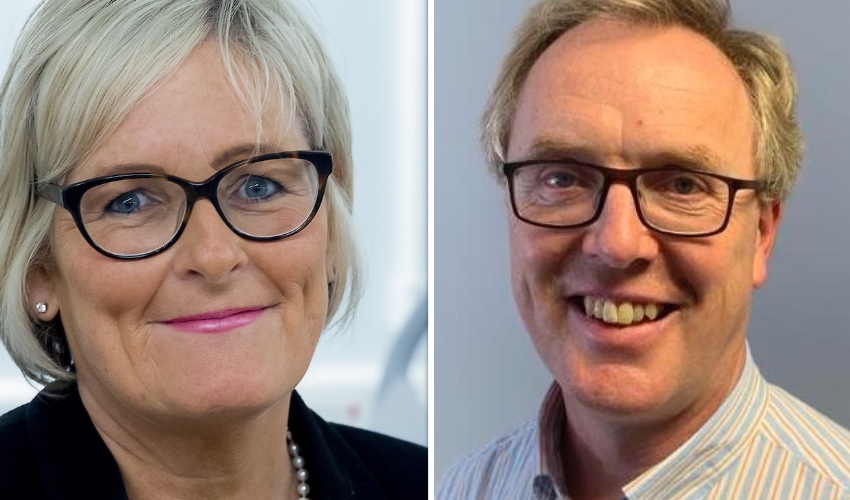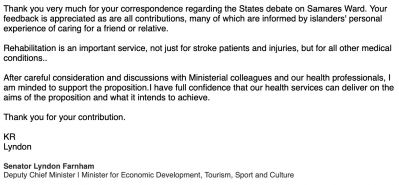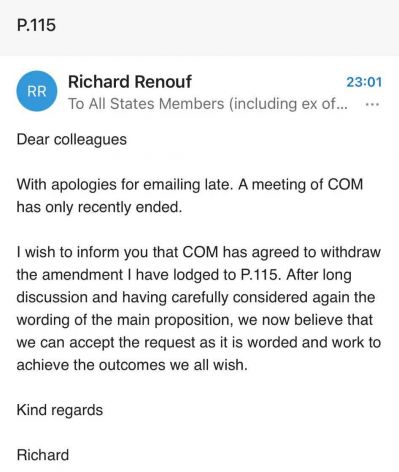


This was a week that the Government might want to forget.
It was a week when a backbench proposition, lodged a little over a month ago, grew into a powerful force that not even the Council of Ministers could control, leading it them to make a last-minute U-turn, and pick at its wording in an attempt to avoid a bruising defeat.
It was a week when the narrative was not set by ministers, backbenchers or officials but by the testimonies of ordinary islanders sharing their harrowing stories, some empowered to do so for the first time.
It was a week when deficiencies in one small cog of the vast healthcare machine amplified into wider concerns about morale, bullying, the relationship between management and staff, the new hospital, and the future model of care in Jersey.
And it was also a week when politicians might have been thinking about the forthcoming election when they considered, to paraphrase Pete Seger, which side they were on.
So, what were the forces at play which has ultimately led to general dissatisfaction on all fronts: the reputation of the Council of Ministers damaged, and the ‘successful’ politician behind the amendment feeling unease and distrust over what happens next?
Express spoke to some well-placed sources to get to the bottom of events...
The background to Senator Pallett’s ‘P.115’ proposition – entitled ‘Reopening of Samarès Ward’ – has been well told but, in essence, it was based on his concerns about the quality of care being given to stroke survivors on Plémont Ward at the General Hospital, where rehabilitation services had moved to in May 2020, initially in response to the pandemic.
He included two case studies of patients who had spent time on Plémont, which talked of neglect, isolation, and infrequent and uncertain care after returning home.
In contrast, the two other stories he shared, from those who had spent time on Samarès, spoke of a “gold-standard” setting, complete with private rooms and an open dining area, which not only aided recovery but also created a positive atmosphere among patients and staff.
Armed with these accounts, and receiving strong support from the Constable of St. John, who also had personal experiences of the differing standards of care, Senator Pallett lodged his proposal, and the debate was set for this week.
Despite being called ‘Reopening of Samarès Ward,’ the proposition’s actual words were not as specific. On the advice of the Greffe, the Senator added “or at another suitable location” in case it was impossible to reinstate services at Overdale or a better site was found. That alternative location would be the Health Minister’s choice.
The second part called for a purpose-built rehabilitation unit offering the same facilities and level of care as Samarès to be built as part of new hospital campus, or at another location.
Publicly, the Government was quiet until 11 January, when it published its amendment to the proposal. This watered down Senator Pallett’s call-to-action, removing references to Samarès and pledging to “continue to restore and improve” rehabilitation services.
Whereas Senator Pallett had asked for them to be reinstated at Samarès - or another suitable location - by 1 March, Health Minister Richard Renouf instead said that a progress report would be ready by then.
The amendment also said a stroke consultant was being recruited, although a locum had started this month on a six-month contract, and a “rehabilitation improvement group” had been established to improve care on Plémont Ward.
Staff with experience of both wards raised suspicions about the group's efforts - one senior medic described them as largely "flipchart-based", and revealed that they had only begun holding workshop-style meetings with staff shortly before Christmas.
This recent effort to make improvements equally raised the suspicions of Members during the subsequent debate, who asked why it hadn’t happened sooner, when Plémont had been providing rehabilitation for 87 weeks, and accused the Minister of only acting once the proposition had been lodged.
In fact, it is understood that originally the Minister wanted his amendment to specifically say that rehabilitation services would stay on Plémont; however, other ministers said they couldn’t support this as more and more powerful case studies were shared in the media and elsewhere by people stepping up to tell their stories.
In the end, Deputy Renouf agreed that a reworded amendment – without reference to Plémont – would give the Government both time and latitude, and stood a much higher chance of being accepted.
Last Friday, the Government ramped up its publicity efforts – backbenchers would later call them ‘propaganda efforts’ - by publishing a video on its social media channels. Supporters of services returning to Samarès quickly dissected its 3 minutes and 15 seconds of waving staff, close-up shots of rehabilitation exercises and explanations by managers.
Most of the comments on the Government’s own Facebook post were critical and, over the weekend, there were even accusations that some managers it featured had never been seen on the ward – although this was strongly denied by Deputy Renouf in the debate, who called the comments not only wrong but also “derogatory, hurtful and against the values we hold”.
However, it is understood that some ministers on the Council thought the video was a mistake, not least because it was not clear exactly who the Government was trying to persuade by making it.
On Monday, while the Health Minister and his senior team, including Medical Director Patrick Armstrong and Jersey Care Model lead Dr Anuschka Muller were briefing the media, an ‘open letter’ was sent to all States Members from Mr Armstrong and Chief Nurse Rose Naylor.
In it, they said: “It is our view and our clinical judgement, supported by having an overview of all our services and staff, that simply moving this service back to its original site at Overdale would be a mistake.”
They added: “To be forced to reverse any clinical decision taken to protect and keep our patients safe or which impacts our ability to provide the highest quality care we can is in our opinion both dangerous and unsafe.” Exactly why it was being suggested that doing so would be "unsafe" was not detailed - though Health staff have privately speculated that it is due to the department's current staffing crisis, as fewer are needed to deal with patients all within a smaller ward like Plémont.

Pictured: Rose Naylor and Patrick Armstrong who warned the Pallet proposition involved issues of clinical safety.
Some ministers were surprised, disappointed and irked that this letter had been sent, as it broke the protocol that “advisers advise and ministers decide”, and some in the inner circle thought it was another communications blunder that would prove to be more incendiary than persuasive.
It also, however, highlighted the age-old friction that occurs when the tectonic plate of professional opinion clashes with the shifting and – at times – unstable plate of politics.
It is understood that some senior clinicians openly voiced their belief to ministers that this was a case of politicians interfering in clinical decisions that should be made by clinicians. There were no threats of resignation, but their frustration was clear.
The response they received was that this had become a problem so serious, and the case studies so powerful, that ministers had to address it in the political arena.
In his amendment, Deputy Renouf had said: “While every effort was made to continue the service in Plémont Ward, it is recognised that, due to the different setting and the impact of the ongoing pandemic, the care and rehabilitation experience on Plémont Ward has not been the best for every patient since the move.”
The Government’s view softened further as the debate neared to acknowledge that some aspects of rehabilitation “were not being delivered to the standard we aspire to”.
Later, this extended to an apology to those patients who felt they had not received the appropriate care, and an admission from the Health Minister that “we took the eye off the ball over the care at Samarès Ward.”
Set against the challenges of covid, he said: “We may have missed raised flags that in better times we would have seen. This is hugely regrettable, and I wish it could have been different”.
However, in parallel to this more placatory tone, further accounts of frustration and sub-standard care emerged, including from health professionals themselves, who also talked about a “toxic culture of fear” in Health, which stopped people from speaking out.
On Monday night, Environment Minister John Young emailed his fellow ministers to reiterate his stance - already shared with them before their amendment had been lodged - that he would be supporting Senator Pallett. He also suggested that the Council rethink its position.
Deputy Young would later publicly state his support for P.115 during the debate.
By Tuesday morning, with the States’ questions underway, some ministers had started to wobble, calling on the Council to meet as a matter of urgency.
Housing Minister Russell Labey emailed fellow ministers on Tuesday lunchtime calling for a meeting, sharing his belief that the debate was becoming increasingly difficult to win.
International Relations Minister Deputy Carolyn Labey, who was unable to attend the evening meeting, also shared her thoughts with Ministers. She questioned what exactly was being objected to in Senator Pallett's proposition. She also went a step further, suggesting that the saga had cast doubt on the new model for community-based healthcare in the island, the Jersey Care Model.
Various ministers held ad hoc discussions before the States resumed after Gary Burgess’s funeral, as it became clear the tide was turning against them.
A full Council of Ministers meeting – minuted and with officials present – was held at 6 pm that evening. Deputy Young reiterated his view again, as did Deputy Labey, and External Relations Minister Ian Gorst warned that the Council would lose the debate without a change of tack.
Ministers decided to have a closer look at the text of the proposition, asking if required a return to Samarès, and what exactly had to be achieved by the 1 March.
Health officials once more raised concerns that the legislature was interfering in a clinical and operational decision but, again, there was a wider consensus that the issue was firmly in the political realm.
For quite a long time into the three-hour meeting, the Health Minister, together with Chief Minister John Le Fondré, were set on holding the line and maintaining the amendment.
Deputy Chief Minister Lyndon Farnham then said he could support Part B of the proposal – to ensure that a purpose-built rehabilitation unit, including all the facilities and bed-numbers formerly offered at Samarès, is built at the new hospital.
As the political head of the project, he was the one person in the room who could offer that level of assurance.
As discussions continued, the penny appeared to drop that the Council was not only going to lose the proposition but they also couldn’t be seen to ignore the powerful accounts of islanders.
Senator Farnham decided that he could, in fact, support the entire proposition, and began emailing campaigners to let them know. Some have questioned whether the matter was a fait accompli - or nearly one - at this point.

Pictured: One of the emails sent by Senator Farnham in advance of the Health Minister confirming the amendment would be withdrawn.
Deputy Renouf expressed concern about uprooting staff to reinstate services at Samarès but he became convinced that the wording of the proposition gave him flexibility and options beyond that.
The meeting ended with agreement that they would withdraw the amendment, satisfied that they could make it work. The Health Minister, however, appeared clear at that stage that rehabilitation services would not be going back to Samarès.
The news of the U-turn was shared with all States Members via an email sent at 23:01 - literally at the eleventh hour - by Deputy Renouf.
“Dear colleagues,” it said. “With apologies for emailing late. A meeting of COM has only recently ended. I wish to inform you that COM has agreed to withdraw the amendment I have lodged to P.115. After long discussion and having carefully considered again the wording of the main proposition, we now believe that we can accept the request as it is worded and work to achieve the outcomes we all wish. Kind regards, Richard”.

Pictured: A copy of Deputy Renouf's email.
It was now a certainty that the proposition would succeed.
Wednesday’s debate has been widely reported on but with the amendment’s withdrawal and the Council’s support, Senator Pallett’s proposition was passed unanimously.
However, before the debate had even ended, Senator Pallett and other backbenchers were raising concerns that ministers had found a loophole and intended to exploit it.
As we know, his proposition charges the Health Minister with reinstating rehabilitation services at Samarès “or at another suitable location, as determined by the Minister”, and Deputy Renouf clearly stressed that latter option during the debate.
He even he asked for clarification from the Bailiff that the proposal did not only mean a return to Overdale.
Following the five-hour debate, Senator Pallett subsequently published his own open letter, which stated: “The spirit of the proposition is to reinstate Samarès Ward to its intended use by 1 March 2022 so I hope States Members will support me in ensuring that this goal is achieved.”
However, from all the insights and evidence seen and heard so far, the Health Minister has no desire to do this, meaning the battle over rehabilitation services could be far from over.
Comments
Comments on this story express the views of the commentator only, not Bailiwick Publishing. We are unable to guarantee the accuracy of any of those comments.